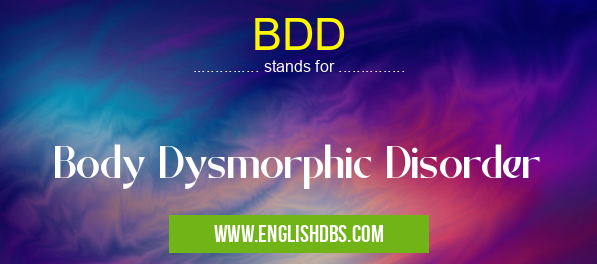What does BDD mean in THERAPY
BDD, short for Body Dysmorphic Disorder, is a mental health condition in which an individual becomes excessively preoccupied with one or more perceived flaws in their physical appearance. These flaws may be real or imagined, and they can range from minor imperfections to severe deformities.

BDD meaning in Therapy in Medical
BDD mostly used in an acronym Therapy in Category Medical that means Body Dysmorphic Disorder
Shorthand: BDD,
Full Form: Body Dysmorphic Disorder
For more information of "Body Dysmorphic Disorder", see the section below.
Symptoms of BDD
- Intense preoccupation with physical appearance: Individuals with BDD spend an excessive amount of time worrying about their looks, to the point where it interferes with their daily life.
- Negative body image: They may have a distorted or exaggerated view of their physical flaws, believing they are醜い or deformed.
- Repetitive behaviors: People with BDD often engage in repetitive behaviors, such as checking their appearance in mirrors, grooming excessively, or seeking reassurance from others about their appearance.
- Social isolation: They may avoid social situations due to embarrassment or anxiety about their perceived flaws.
- Depression and anxiety: BDD can lead to significant emotional distress, including feelings of worthlessness, shame, and social anxiety.
Causes of BDD
The exact causes of BDD are not fully understood, but genetic, environmental, and psychological factors are believed to play a role.
- Genetics: Some studies suggest a genetic predisposition to BDD.
- Environmental factors: Exposure to negative body image ideals through media or social comparison may contribute to the development of BDD.
- Psychological factors: Individuals with BDD may have a tendency to be perfectionistic, self-critical, and have low self-esteem.
Treatment for BDD
Treatment for BDD typically involves a combination of therapy and medication.
- Therapy: Cognitive-behavioral therapy (CBT) is a common form of therapy used to help individuals challenge their negative body image and develop more positive coping mechanisms.
- Medication: Antidepressants, such as selective serotonin reuptake inhibitors (SSRIs), can be effective in reducing symptoms of depression and anxiety associated with BDD.
Essential Questions and Answers on Body Dysmorphic Disorder in "MEDICAL»THERAPY"
What is Body Dysmorphic Disorder (BDD)?
BDD is a mental health condition in which a person has an excessive preoccupation with a perceived flaw or defect in their physical appearance. This preoccupation causes significant distress and impairment in daily life.
What are the symptoms of BDD?
Symptoms of BDD can include:
- Excessive concern about a perceived flaw or defect in appearance
- Repetitive behaviors, such as mirror checking, grooming, or seeking reassurance
- Avoidance of social situations due to fear of being judged
- Body dysmorphic thoughts, such as believing that you are ugly or deformed
- Low self-esteem and depression
What causes BDD?
The exact cause of BDD is unknown, but it is thought to be caused by a combination of genetic, environmental, and psychological factors.
How is BDD diagnosed?
BDD is diagnosed by a mental health professional, such as a psychiatrist or psychologist. They will conduct a clinical interview and review your symptoms to determine if you meet the diagnostic criteria for BDD.
How is BDD treated?
BDD is typically treated with a combination of therapy and medication. Therapy can help you to change the way you think about your appearance and to develop coping mechanisms for dealing with your symptoms. Medication, such as antidepressants, can help to reduce the severity of your symptoms.
How can I help someone with BDD?
If you know someone who you think may have BDD, you can help them by:
- Encouraging them to seek professional help
- Providing support and understanding
- Avoiding making comments about their appearance
- Helping them to focus on their positive qualities
Final Words: BDD is a serious mental health condition that can have a significant impact on an individual's life. However, with proper diagnosis and treatment, individuals with BDD can learn to manage their symptoms and improve their quality of life.
BDD also stands for: |
|
| All stands for BDD |
